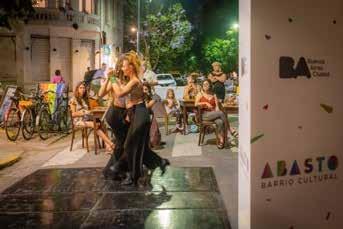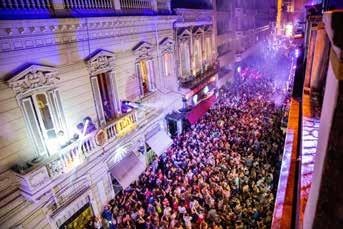
3 minute read
LESSONS FROM A YEAR IN “PANDEMIA
By: Enrique Avogadro
MINISTER OF CULTURE OF THE CITY OF BUENOS AIRES REFLECTS ON 2020 AND THE CORONAVIRUS CRISIS AND WHERE THE ARGENTINE CAPITAL’S CULTURE SCENE GOES FROM HERE
2020 is definitely a year that we will have to work hard to forget. Arts and culture were particularly hard hit by the pandemic. Without open cultural venues and events, artists were left without performing or teaching opportunities and, in most of the world, with no safety net on which to rely during these hard times. Cultural festivals – primary targets in a social-distancing environment – had to be cancelled or postponed indefinitely.
Cultural areas in countries and cities around the world struggled to provide some help. The Buenos Aires arts and culture ecosystem usually never sleeps. We run around 10 international festivals, including FIBA (theatre), BAFICI (film) and Tango. We are in charge of Teatro Colón, as well as a very strong network of public libraries, public theaters, museums, art schools and a wide array of programs. We have more than 500 independent cultural venues. It has been a rough and busy year: we provided economic support, we launched a new streaming cultural service, and we drafted protocols in order to get each arts and cultural venue safely back on track. With our great summer season about to begin as I write, while we are still in the midst of the pandemic, we have been trying to understand what will be expected from cultural public policies in the years to come and how we can rethink our tools to have a greater impact.
Festivals play an especially important role in bringing us together to celebrate our diversity. In this respect, they help us fulfill communal purposes that will be more important than ever in the postpandemic era. The future of festivals is also the future of arts and culture. Some lessons can already be extracted from this long and hard COVID-19 road that we are still walking that might be useful to help us foresee the challenges and opportunities that still await us.
RECLAIM THE CITY
This year we had to completely rethink our relationship with the public realm. Suddenly, parks and other open-air venues became spaces for birthdays, weddings and other celebrations. Art professors, guitar teachers and yoga instructors took their classes outside, while cultural venues spread themselves out onto the sidewalks and streets. New local alliances and networks emerged as a way to weather the economic storm, bringing together independent bookstores, art galleries and restaurants.
Festivals will have the chance to foster this new vision as well, empowering people to reclaim their city for arts and culture and, in this way, to build a stronger sense of citizenship. Festivals can also become platforms to showcase hyperlocal cultural activities.
TECHNOLOGY THAT BRINGS US TOGETHER
In 2020 we dealt with social distancing by using technology. Zoom, Teams, WhatsApp and other platforms helped us to stay in touch, to learn, to create and to come together. In Buenos Aires, we had record audiences for online performances offered by our theatres, museums, music venues and opera houses. The challenge ahead is how to continue to use these newly discovered tools to stay in touch, to find new ways to create, to build meaning into arts and culture projects. Participation and commitment can be enhanced through these new media in the future.
With hybrid programs in place, festivals can also be portals to other cities’ cultural ecosystems, sharing contents and experiences digitally, and even co-producing projects at a distance.
BUILDING BACK BETTER
Our main challenge is to learn from this annus horribilis in order to be better prepared to weather future disasters. The health of the cultural sector came into question because of this pandemic. Could it be possible to provide safety nets to artists and venues to help them better withstand future crises and to innovate their management practices in order to become more resilient? What role can festivals play in this so badly needed revolution in the cultural world?
The world will be different after COVID-19, and not necessarily for the better. Social inequality will be probably worse after all these harsh months of lockdowns and isolation. Arts and culture will be more important than ever in this new scenario, bringing people together, lifting spirits and providing hope. Festivals should play a key role in helping us overcome the challenges that await us.
Enrique Avogadro was appointed minister of culture of Buenos Aires in December 2017. He is the former deputy minister of culture of Argentina and, was previously undersecretary of creative economy at the City of Buenos Aires.







